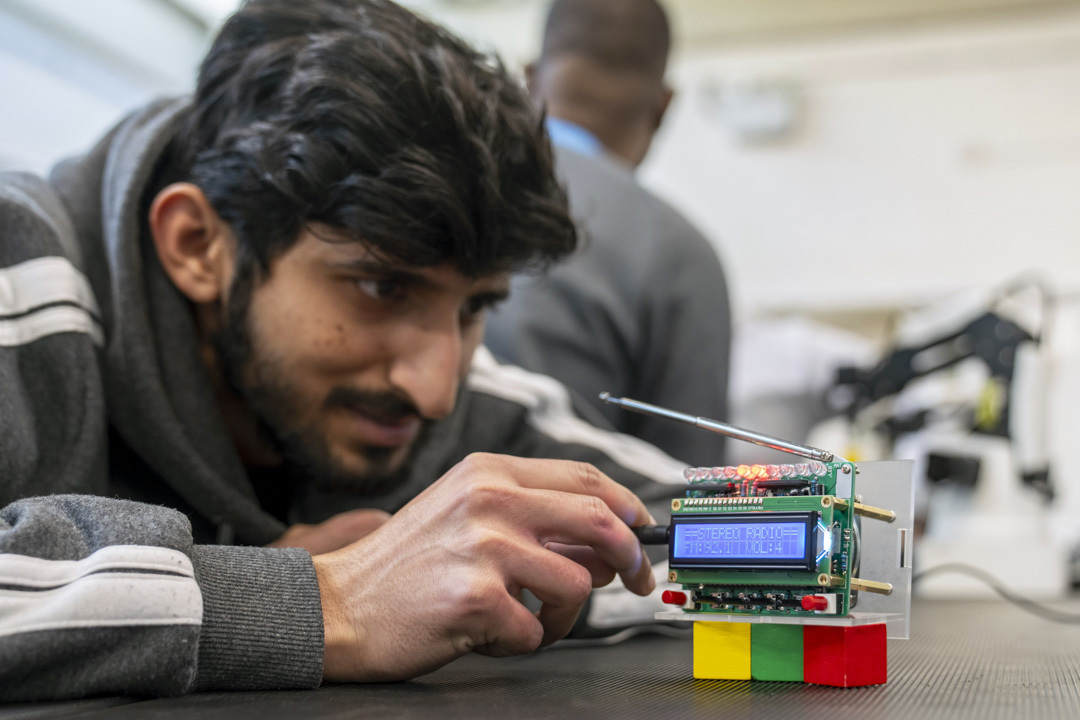
Course overview
Power your future with the skills to design, analyse, and build tomorrow’s technology.
This HNC in Electronic Engineering at Glasgow Kelvin College is designed for those who want to advance their technical knowledge and practical ability in one of Scotland’s fastest-growing industries.
You’ll explore how electronic systems are designed, built, and maintained — from digital and analogue electronics to control systems and programming. With a mix of theory, problem-solving, and hands-on lab work, this course provides the ideal foundation for progressing to degree level study or stepping straight into industry as a technician or junior engineer.
This course is ideal if you:
- Want to start or progress a career in electrical or electronic engineering.
- Enjoy practical work and creative problem-solving.
- Hope to progress to university to study Electrical, Electronic, or Mechatronic Engineering.
- Are looking for a qualification respected by employers and professional bodies.
What you will learn
You’ll gain a mix of analytical, design, and practical skills used across the electronics industry. Your studies will cover:
- Electrical Principles – understanding current, voltage, resistance, and power relationships.
- Power Systems and Power Electronics – exploring energy conversion and control.
- Control Systems and Transducers – learning how sensors and feedback loops manage automation.
- Mathematics for Engineers – building analytical skills (with additional maths units to support university entry).
- Analogue and Digital Electronics – designing and testing modern circuits.
- Software Programming in C++ – developing coding and logic skills for engineering applications.
- Programmable Logic Controllers (PLCs) – learning automation and control programming.
- Electrical and Electronic Instrumentation – using test and diagnostic equipment safely and effectively.
Practical sessions in our state-of-the-art labs help you apply your learning to real-world situations, preparing you for both employment and further study.
Entry requirements
There are several routes to join the course:
✅ At least one Higher at grade C or above (Mathematics or Physics required; if only Physics, National 5 Maths is also required)
✅ One Technical Higher at C (such as Computing Science or Design and Manufacture) plus National 5 Maths at C or above OR
✅ NQ Level 6 Mechanical & Electrical Engineering or NC Level 5 Electrical/Electronic Engineering (with Maths units) OR
✅ Foundation Apprenticeship in Engineering OR
✅ Equivalent qualifications or relevant industrial experience (e.g. SVQs – considered individually)
Applicants without formal qualifications may be asked to demonstrate suitability for the course.
We also welcome female applicants looking to build a new career in engineering.
ℹ️ For this course, if English is not your first language
- you need to have SQA ESOL Higher (or equivalent, click here to see equivalent qualifications)
- If you do not have a formal ESOL qualification but your language skills meet this level, you should apply for your course and then contact our Admissions team to organise an internal language assessment here at the College.
Career Opportunities
With this qualification, you could progress to roles such as:
⚡ Electronic Engineering Technician
🛠️ Control and Automation Engineer
💡 Instrumentation Technician
🔋 Renewable Energy Engineer
📡 Maintenance or Testing Technician
This award also meets the academic requirements for professional registration as an Engineering Technician (EngTech) with the IET and Engineering Council.
Future prospects
Successful learners can progress to:
- Year 1 or 2 of an Electrical and Electronic Engineering degree programme.
- HND Electrical or Electronic Engineering for further specialisation.
- Related university pathways in Building Services or Technology Teaching.
This qualification provides an excellent foundation for higher education and long-term careers across the global electronics industry.




